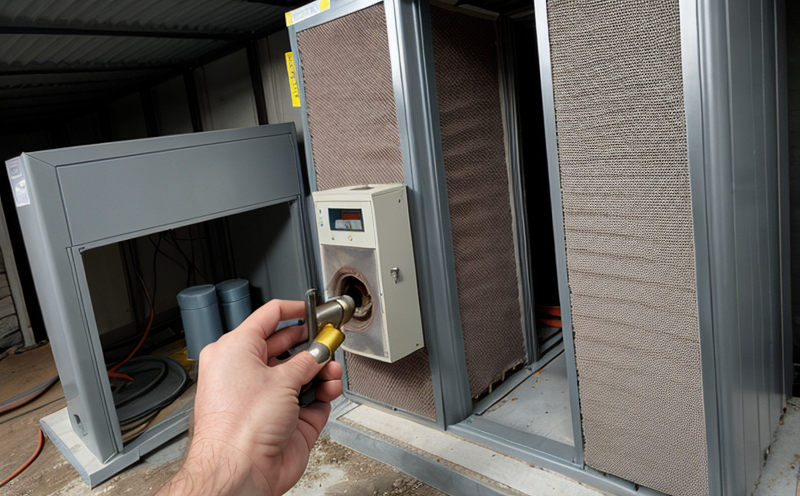ISO 11092 Textiles Physiological effects Measurement of thermal and water vapour resistance
The ISO 11092 standard is pivotal for textiles that are designed to provide protection against heat, cold, or moisture. This service focuses on the physiological effects measurement of thermal and water vapour resistance in textiles, ensuring materials meet stringent performance requirements for personal protective equipment (PPE), clothing, and other applications where thermal and moisture management is critical.
Understanding how textiles behave under various environmental conditions helps manufacturers ensure that their products not only comply with regulatory standards but also perform effectively in real-world scenarios. This service covers the entire process from sample preparation to final analysis, providing accurate and reliable results tailored to meet client needs.
The standard is particularly relevant for sectors such as aerospace, automotive, construction, and healthcare, where thermal insulation is essential. Compliance with ISO 11092 ensures that materials are tested under controlled conditions, allowing for consistent performance across different environments.
Before testing begins, we carefully prepare the samples according to ISO guidelines to ensure consistency in results. This includes controlling factors like humidity and temperature during storage, as these can significantly affect textile properties.
The core of our service involves using advanced instrumentation to measure both thermal resistance (R-value) and water vapour permeability (WVP). These parameters are crucial for determining the suitability of textiles in various applications. For instance, high R-values indicate effective insulation against heat transfer, while low WVP values suggest superior moisture barrier properties.
Our laboratory adheres strictly to ISO 11092 procedures, which include precise control over environmental conditions during testing. This ensures that the results accurately reflect the performance of textiles under real-world conditions. By doing so, we can provide clients with comprehensive reports that not only meet regulatory requirements but also offer valuable insights into how their products will perform in different environments.
Our team of experts uses state-of-the-art equipment to conduct these tests, ensuring accuracy and repeatability. The results are presented in clear, concise reports that include detailed analyses and recommendations for improvement if necessary. This service is invaluable for quality managers and R&D engineers looking to innovate or improve existing products.
| Standard | Description |
|---|---|
| ISO 11092 | Measurement of thermal and water vapour resistance in textiles |
| ASTM E557 | Determination of Water Vapor Permeability by Pressure Method |
| EN 14389 | Evaluation of Thermal Insulation Properties of Textiles and Composite Materials |
Applied Standards
The ISO 11092 standard is complemented by several other international standards that further refine the measurement of thermal and water vapour resistance in textiles. These include ASTM E557, which provides a pressure method for determining water vapor permeability, and EN 14389, which evaluates the thermal insulation properties of textiles and composite materials.
Our laboratory ensures compliance with all these standards to provide clients with comprehensive testing services that cover every aspect of textile performance. By adhering to these rigorous standards, we can guarantee accurate and reliable results that meet both regulatory requirements and customer expectations.
Benefits
The benefits of ISO 11092 testing are numerous and far-reaching. For quality managers, this service offers a way to ensure that products consistently meet performance criteria, enhancing reliability and customer satisfaction.
Compliance officers can leverage these tests to stay ahead of regulatory changes, ensuring their organizations remain in line with the latest standards. R&D engineers benefit from detailed insights into material behavior under various conditions, allowing for innovations that improve product performance.
For procurement teams, this service provides a trusted source for verifying supplier claims and ensuring consistent quality across multiple batches. By using ISO 11092 testing, clients can be confident in the thermal and moisture resistance of their materials, leading to better-informed decisions and improved supply chain management.
Ultimately, the benefits extend beyond individual organizations; they contribute to safer environments for end-users by ensuring that personal protective equipment (PPE) and other critical textiles perform as expected. This service plays a vital role in safeguarding public health and safety across various industries.
International Acceptance and Recognition
- The ISO 11092 standard is widely recognized for its rigorous methodology in measuring thermal resistance and water vapour permeability.
- Countries around the world have adopted this standard as a benchmark for textile performance, ensuring consistent quality across international markets.
- Regulatory bodies such as OSHA, EU PPE Directive, and others accept results from ISO 11092-compliant laboratories, providing an additional layer of assurance for manufacturers and users alike.





